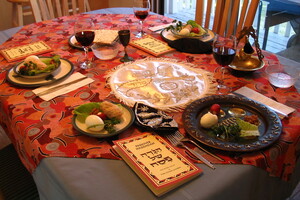The celebration lasts a week.

In the evening of April 15, Jews will begin to celebrate Passover – a holiday dedicated to the Exodus from Egypt. The celebration lasts a week, this year it will end on April 23. It is usually held in a cheerful and joyful atmosphere.
Read also: Annunciation: prohibitions and signs of the holiday
Traditions of celebration
As already mentioned, the celebration lasts a week. A special place is given to seder – a traditional family dinner, during which prayers and blessings are read. It is followed by five weekdays, and on the last weekend of Passover, a “water-sharing” ceremony is held in the synagogue to commemorate how the sea divided before the Jews as they left Egypt.
Jews gather on the seder after sunset on Nisan 14. The needy and those who for some reason cannot celebrate Passover with their relatives are also invited to dinner.
Candles are lit in front of the seder, and food is served in a special plate. Traditional holiday dishes: matzah – fresh “bread of poverty” eaten by Jews in Egypt, maror – bitter herbs, a symbol of the bitterness of slavery, beytsa – boiled eggs, a symbol of life, haroset – grated apples mixed with dates and nuts, a symbol of clay, with which the Jews made bricks in slavery, zroa – a roasted piece of lamb that is not eaten – a symbol of sacrifice in Egypt, wine (for children – grape juice) – each participant must drink four glasses, and the fifth is left intact for the prophet Elijah, Salted water is a symbol of the tears of slavery.
Seder serves other festive dishes: stuffed fish, stewed sweet potatoes, chicken in honey sauce.
What cannot be made in Pesach
At this time it is forbidden to eat ham – any flour dishes prepared by fermentation or sourdough. For example, bread, beer and other alcoholic beverages are prohibited. Hamets is forbidden not only to eat throughout Passover, but also to keep it at home.
The house must be thoroughly cleaned and all prohibited products must be disposed of.
On the first and last day of Pesach, it is forbidden to work, and on other days it is allowed to work.




